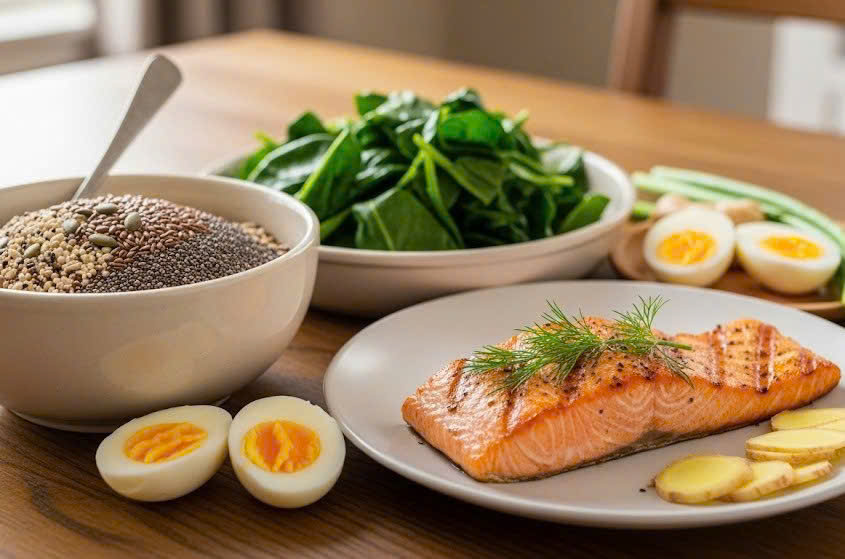Headaches are a common ailment, stemming from various factors such as stress, sleep disturbances, hormonal fluctuations, poor cerebral circulation, dehydration, or low blood sugar. Dr. Nguyen Anh Duy Tung from the Nutrihome Nutrition Center explains that in addition to addressing the underlying cause, dietary adjustments prioritizing nutrients that regulate nerves, dilate blood vessels, and combat inflammation can assist in managing headaches.
Whole grains and nuts provide B vitamins (especially B2 and B6), fiber, and magnesium. The tryptophan in these foods helps regulate neurotransmitters and increase serotonin production, benefiting mood and sleep. Starting the day with oatmeal, nut milk, and fresh fruit can maintain stable blood sugar levels, preventing headaches triggered by hypoglycemia.
Fatty fish like salmon, tuna, and sardines are abundant in omega-3 fatty acids, which possess natural anti-inflammatory properties, reducing the frequency and severity of migraine attacks. Adults can consume fatty fish 2-3 times a week, preferably steamed or lightly pan-fried rather than deep-fried to preserve nutrients.
Leafy greens such as spinach, kale, and lettuce are rich in magnesium, a mineral that plays a role in relaxing blood vessels and regulating nerve transmission. Magnesium deficiency has been linked to headaches in certain groups, particularly women during menstruation. Incorporating leafy greens into main meals daily, prioritizing boiling, steaming, or light stir-frying to retain nutrients, is recommended.
 |
Foods containing magnesium, vitamin B2, and omega-3s can help alleviate headaches. Photo: Trong Nghia |
Foods containing magnesium, vitamin B2, and omega-3s can help alleviate headaches. Photo: Trong Nghia
Ginger boasts anti-inflammatory and antioxidant properties, soothing nausea and headaches. Individuals experiencing headaches can consume warm ginger tea, ginger soup, or add fresh ginger slices to their meals. However, those with stomach issues should consume ginger in moderation.
Eggs are rich in riboflavin (vitamin B2), which has been linked to a decrease in migraine frequency. Each egg provides approximately 25% of the daily vitamin B2 requirement. Consuming 2-3 boiled eggs per week combined with leafy greens enhances nutritional value.
Individuals should limit foods that can trigger headaches, such as instant noodles, canned foods, foods high in monosodium glutamate (MSG), processed meats (sausages, bacon), and high doses of coffee. These items may contain substances like tyramine, nitrates, and caffeine that cause abnormal constriction and dilation of blood vessels, stimulating nerves or leading to dehydration, thereby initiating or exacerbating headaches.
Dr. Duy Tung advises those who frequently experience headaches to ensure adequate sleep, minimize stress, exercise regularly, avoid overusing pain relievers, and seek medical attention if headaches become unusual. Supplementing with natural extracts like blueberry and ginkgo biloba can enhance cerebral blood flow, improve neural connections, and reduce headaches and insomnia.
Trong Nghia
| Readers can submit nutrition-related questions here for expert answers. |












